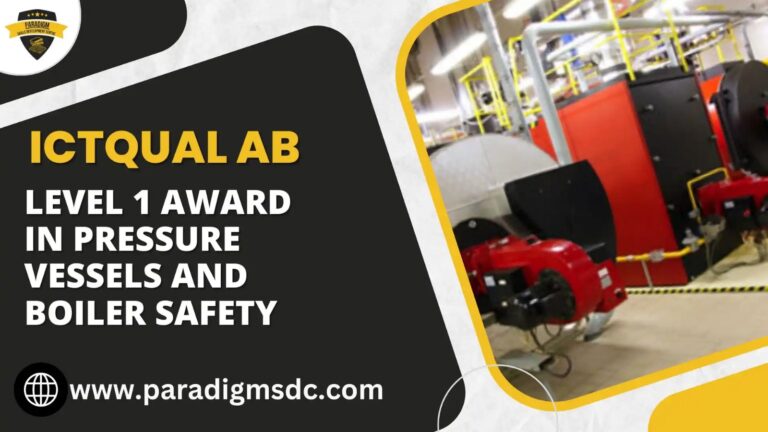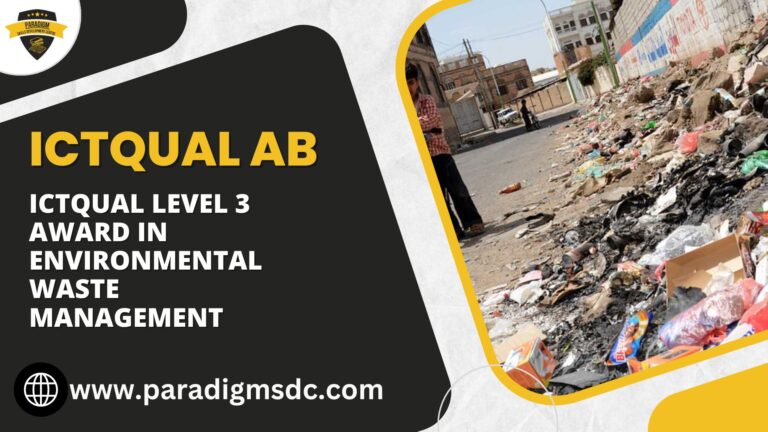If you’re looking to fast-track your career in environmental engineering, the ICTQual Level 3 Diploma in Environmental Engineering is the perfect opportunity. This program is designed to provide a comprehensive understanding of environmental engineering concepts while equipping you with the practical skills necessary for success in this growing field. The best part? You can complete the entire 60-credit diploma in just 3 months.
Environmental challenges like climate change, waste management, and renewable energy require skilled professionals who can develop sustainable solutions. The ICTQual Level 3 Diploma in Environmental Engineering prepares you to tackle these challenges by focusing on both theoretical and practical aspects of the field.
This program is ideal for individuals who want to enter or advance in the environmental engineering field. Whether you’re a recent graduate or a professional looking to specialize in sustainability and environmental management, this diploma provides a strong foundation.
Don’t wait to start your journey in environmental engineering. The ICTQual Level 3 Diploma in Environmental Engineering (60 Credits) is your gateway to an exciting career that makes a difference. With the option to complete it in just 3 months, you’ll be ready to tackle the world’s environmental challenges sooner than you think.
Study Units:
- Fundamentals of Environmental Engineering
- Sustainable Development and Green Engineering
- Pollution Control and Resource Management
- Environmental Monitoring and Reporting
- Environmental Policy and Governance
- Advanced Topics in Environmental Engineering
Learning Outcomes:
Below are the learning outcomes for each of the study units in the ICTQual Level 3 Diploma in Environmental Engineering program:
Unit 1: Fundamentals of Environmental Engineering
By the end of this unit, learners will be able to:
Understand core principles of environmental science and their relevance to engineering. Explain the structure and function of ecosystems and their interconnections. Analyze key environmental challenges such as climate change, biodiversity loss, and resource depletion. Apply foundational knowledge to assess environmental impacts and propose engineering solutions.
Unit 2: Sustainable Development and Green Engineering
By the end of this unit, learners will be able to:
Define sustainable development and its importance in engineering practices. Identify and evaluate green engineering techniques for reducing environmental impact. Demonstrate knowledge of renewable energy sources such as solar, wind, and bioenergy. Assess strategies for energy efficiency and resource conservation in engineering projects.
Unit 3: Pollution Control and Resource Management
By the end of this unit, learners will be able to:
Describe the main types and sources of pollution affecting air, water, and soil. Evaluate methods for reducing and mitigating pollution in various environments. Analyze resource management strategies and their impact on sustainability. Develop an understanding of waste minimization and recycling techniques.
Unit 4: Environmental Monitoring and Reporting
By the end of this unit, learners will be able to:
Explain the principles of environmental monitoring and its importance. Identify tools and methods used to measure air, water, and soil quality. Analyze environmental risk assessment processes. Interpret and document environmental data for reporting and decision-making. Understand the role of GIS in monitoring environmental changes.
Unit 5: Environmental Policy and Governance
By the end of this unit, learners will be able to:
Understand global environmental laws and treaties. Explain the role of national and international regulatory frameworks in environmental protection. Assess the contribution of governments, NGOs, and businesses to environmental governance. Analyze policies aimed at addressing climate change and promoting sustainability. Evaluate the ethical and social implications of environmental policies.
Unit 6: Advanced Topics in Environmental Engineering
By the end of this unit, learners will be able to:
Explore emerging technologies in environmental engineering. Explain innovations in water treatment, air purification, and renewable energy systems. Analyze sustainable urban planning and infrastructure development approaches. Assess engineering solutions to address global environmental challenges. Understand the application of advanced techniques in solving complex environmental issues.







